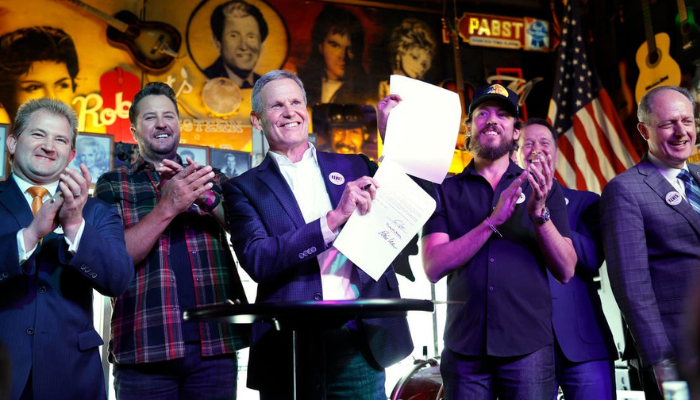Tennessee is the first US state to safeguard musicians from AI threats

The legislation aims to shield music industry professionals from unauthorized replication of their intellectual property
Tennessee Governor Bill Lee approved legislation on Thursday aimed at safeguarding songwriters, performers, and other music industry professionals from the potential risks posed by artificial intelligence.
This decision positions Tennessee, renowned as the birthplace of country music and the starting point for music legends, as the first state in the US to implement such protections. Advocates assert that the objective is to prevent AI tools from replicating an artist’s voice without their permission. The law will come into effect on July 1.
“We have more people employed in Tennessee in the music industry than any other state,” Lee stated to reporters shortly after enacting the law. “Artists possess intellectual property. They possess talents. They possess a uniqueness that is distinctly theirs, certainly not artificial intelligence.”
Tennessee is among three states where names, photographs, and likenesses are considered property rights rather than rights of publicity. Under the newly enacted statute, known as the Ensuring Likeness, Voice, and Image Security Act or “Elvis Act,” vocal likeness will now be included in that category.
The effectiveness of the legislation in protecting artists’ work from being scraped and replicated by AI without consent is still uncertain. Supporters, including Lee, acknowledged that despite the widespread support from within the music industry and the unanimous approval from the Tennessee statehouse, the legislation has yet to be tested. This level of bipartisan agreement is a rare occurrence, especially amidst ongoing clashes between the GOP supermajority and a few Democrats.
Many musicians in Tennessee argue that they cannot afford to wait for a perfect solution, noting that AI threats are already emerging on their phones and in their studios.
“I receive material on my phone that I can’t distinguish from my own work,” noted country star Luke Bryan. “It’s a genuine issue now, and hopefully, this legislation will help curb and slow it down.”
The Republican governor chose to sign the bill at the heart of Nashville’s Lower Broadway, in the packed Robert’s Western World. The venue is frequently filled with tourists eager to experience traditional country music.
Naming the newly enacted law after Elvis Presley was not just a tribute to one of the state’s most iconic residents.
Presley’s death in 1977 triggered a prolonged and contentious legal dispute over the unauthorized use of his name and likeness. Many argued that once a celebrity passed away, their name and image became part of the public domain.
However, in 1984, the Tennessee legislature enacted the Personal Rights Protection Act, which clarified that personality rights do not cease at death and can be inherited by others. The law states that “the individual rights … constitute property rights and are freely assignable and licensable, and do not expire upon the death of the individual so protected.”
This move was largely viewed as crucial for safeguarding Presley’s estate. Over the decades, it has also been praised for protecting the names, photographs, and likenesses of all public figures in Tennessee.
Now, Tennessee will extend these protections to vocal likeness.


